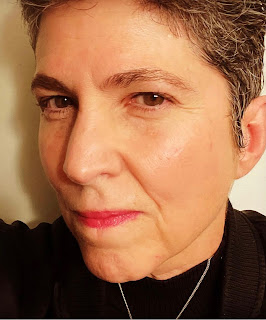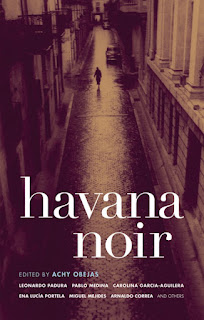By Marta Fernandez Campa
Critically acclaimed Cuban-American writer and translator Achy Obejas is the author of many works of prose and poetry, including seminal texts such as We Came all the Way from Cuba so You Could Dress Like This? (1994) and Memory Mambo (1996). Obejas’ most recent publication, Boomerang/Bumerán (2021), is a book of poetry that explores a wide range of themes, including love, exile, politics, gender and language from a multilingual perspective.
Her writing has been widely anthologised in collections such as Cubana: Contemporary Fiction by Cuban women (1998, translated from Spanish), Our Caribbean: A Gathering of Lesbian and Gay Writing from the Antilles (2008), and Radical Hope: Letters of Dissent in Radical Times (2017), to name a few. She is also a journalist and has published investigative and opinion articles for The Chicago Tribune, The New York Times, Out, The Washington Post, The Village Voice and other publications.
She is the recipient of multiple awards, including a Lambda Award and a Pulitzer Prize for her journalistic work, alongside National Endowment for the Arts and Ford fellowships. Her most recent short story collection, The Tower of the Antilles (2017), was nominated for a PEN/Faulkner award.
The following interview with Achy Obejas, conducted by email, is part of SWAN’s series of conversations with translators of Caribbean writing, in association with the Caribbean Translation Project.
SWAN: How did your interest in translation begin?
Achy Obejas: I feel like I’ve always been doing translation. When
we first arrived in the U.S., I was six and took to English very quickly, so
that I became my family’s translator/interpreter. This meant that, for me,
translation came very naturally. It wasn’t until I began doing it
professionally that I realized it was actually a specific skill set, that it
wasn’t just what you did to help your (immigrant) parents along.
When I first moved to
Chicago, I began doing interpreting gigs: depositions, labor disputes, medical
emergencies. I had to learn new vocabulary, reconsider the casual Spanish of my
family, and the regional variants that often came into play.
After Havana Noir
came out, David Unger was gracious enough to recommend me to translate Junot
Díaz’s Brief and Marvelous Life of Oscar Wao. I honestly didn’t think I
stood a chance so when I was asked for a sample, I just went with a kind of
Spanglish that complemented what Junot was doing in English. I got the job, and
great reviews for the translation, and suddenly I was a translator of literary
fiction.
SWAN: You’ve translated the work of many Caribbean authors,
including Rita Indiana Hernández, Wendy Guerra and your own writing. Can you
tell us more about these collaborations and your process of translation?
A.0.: Every author is different. A lot depends on their
personality, the work, their own level of interest in the translation, their
own knowledge of English. Wendy just hands it (over) and trusts me to do her
right, and of course I cherish that trust. With Rita, I had a few questions but
it was mostly a hands-off situation.
I honestly prefer when
I’m left to my own devices, to ask questions when I have them but to not feel
too supervised. My worst experiences have been with authors who think they
speak English, for Spanish, well enough to intervene. It’s usually not the
case, and it requires a lot of diplomacy.
I’m a pretty
straightforward translator - I read the text and take notes for questions,
research, challenges and doubts. And then I dive in, chronologically, usually
one page per session, with several sessions in a given day. I re-read the
previous day’s work every morning. After each chapter, I back up and read from
scratch, just to make sure the voice is steady, that there aren’t connections
I’ve missed, that kind of thing.
SWAN: How important is translation for today’s world, especially for communities that might be underrepresented?
A.O.: I think it’s vital. I’m always disturbed by this
notion that the translator is somehow a traitor. The translator is a bridge, a
pathfinder, the one who makes communication possible. And communication is
imperative in our fractured world. And given that the world’s superpower
refuses to foster multilingualism, then I think translation is our only hope of
expanding minds and opening hearts.
SWAN: In the Caribbean, as in other regions, it sometimes
feels as if countries are divided by language. How can people in the literary
and education spheres help to bridge these linguistic “borders"?
A.O.: I think the only way that’s real is to learn each
other’s stories, to get closer to each other’s lives. We do that by talking to
each other, which means we use translation as a bridge, not just to understand
each other’s language but each other’s experiences and how they shape each of
us.
SWAN: How do you see literary translation evolving to reach
more readers?
A.O.: I think it’s a pretty exciting time to be a
translator, and a terrific time for discussions about the hows and whys of
translations. Language is always evolving but right now feels like a very
emphatic moment in terms of gender, disability, race and other political
concerns and how language frames these conditions. It seems to me I’m
constantly re-evaluating and reconsidering my approach.
A.O.: Wider circulation, I hope, of indigenous texts. And
greater respect and honor for indigenous communities, their histories and
stories. And a greater understanding too of how much those languages have
infiltrated and influenced more widely used languages, especially European
languages. Because we owe a lot.
SWAN: Congratulations on the
publication of Boomerang / Bumerán, your
latest poetry collection. In its Author´s Note, you mention that you wanted to
write largely a gender-free text and you highlight the challenge particularly
with the sections in Spanish, a language that is marked by gender categories in
its grammar and that, as you say, “exists on the binary.” How do you see the
poems disrupting gender binaries as well as other binaries and discursive
levels?
A.O.: Most of the time when we talk about inclusive
language in Spanish, it means degendering persons, but the rest of the language
remains gendered: the table is feminine, the coffee is masculine. I have yet to
understand why that’s okay in a supposed de-gendered text; I have yet to
understand the utilitarian nature of gender. So, in Boomerang/Bumerán, I
de-gendered the table and the coffee and everything in between. I don’t think
you kill the binary in persons but allow it in things; why?
This is, of course, an
intellectual and political exercise. Most of us only de-gender a little here
and there in our speech - todes, amigos, that kind of thing - but I wanted to
propose a vision of another possibility. Not the way necessarily, but a way.
SWAN: What are your next projects?
A.O: I’m currently working on a novel. I’m excited about returning to that form.
Photos (top to bottom): Writer and translator Achy Obejas; Havana Noir (Akashic Books); Revolution Sunday by Wendy Guerra, translated by Achy Obejas; the cover of Boomerang/Bumerán by Achy Obejas.
Marta Fernandez Campa is a researcher and lecturer based in London, with
various research interests, including multi-lingual texts and the role of
translation.
Follow the Caribbean Translation Project on Twitter: @CaribTranslate



